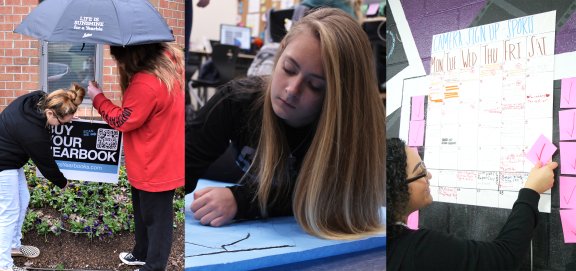Time to make a plan for next year’s yearbook staff!
With each new school year, there’s an opportunity to take stock of yearbook staff management – to look at what worked and what didn’t, and to consider making changes that could improve processes for staff training and yearbook production. As advisers and staff leaders start looking toward the year ahead, take some time to focus on a few areas of staff management that can greatly impact a successful production season.
Editorial Leadership
Editorial leadership benefits everyone on yearbook staff.
- Student leaders gain leadership skills that will serve them well outside the yearbook classroom.
- Members of the production staff benefit from having multiple points-of-contact and subject area experts who can give them direction and help them trouble shoot.
- Advisers may choose to offload certain management responsibilities to capable students freeing up more time to complete tasks unique to their role as adviser.
Staffs can utilize editorial leadership in a number of ways.
- Content-Specific: Editors may be assigned by traditional content areas with roles like Student Life Editor or Sports Editor being responsible for plans that involve section coverage.
- Job-Specific: Some staffs have more success assigning editors by job role, like having a copy editor who manages the writers and overall style of the book or a design editor who manages the work of page designers and helps maintain the visual style guide for the book.
Consider having editors apply for their position by submitting either an application or resume.
Staffing: Roles & Organization
It can be challenging to make a yearbook with a group of students who only want to take photographs. And while photography is essential, all production roles must be filled including writing, design, promotion and sales.
Think about how you want to structure your deadlines and plan your teams accordingly. Some questions you may want to ask could be:
- What are your deadlines with the plant and what deadlines will you make with students? How many page spreads do we have for each deadline?
- How many students do you have on yearbook staff?
- How many students on staff should be assigned to production in the role of writer? Photographer? Designer?
- How many page teams will you have for each deadline, and how many spreads will each page team need to complete for each deadline?
Once you have done some initial planning, consider how you want to divide up your staff and production roles. Clearly communicate the different roles and responsibilities on yearbook staff to students and ask them to apply for the job they want to help you better place them where they want to be.
Establishing Norms
Before school starts think about the type of classroom community you want to create with your yearbook staff. While you will hopefully not need to be mired down with rules and procedures, it doesn’t hurt to think of some basic norms that you want students to follow. Some areas to that you may consider establishing norms around might include:
- Posting on social media
- Publication ownership of images and interviews
- Attributing sources and credibility
- Completing work to deadline
- Checking in / out equipment in a timely matter
- Handling equipment safely and responsibly
- Sharing work as a team
- Responsibilities for outside-of-class participation by covering events
- Promoting the yearbook for sales and fundraising
- Seeking sponsors or participation in ad sales drives
- Additional responsibilities like staff workdays or events
- Procedures for interviewing students and/or interrupting a class in session
You may set your own class norms or have students participate in creating them, but once norms are set, think about having all students (and potentially parents) sign off on important agreed upon expectations.
The Expectations Contract is a great resource to help get you thinking.
There are many more resources and tools to use as you prepare for next year in the Jostens Digital Classroom. Ask your rep for more details.



